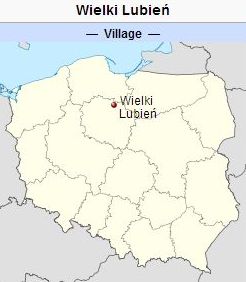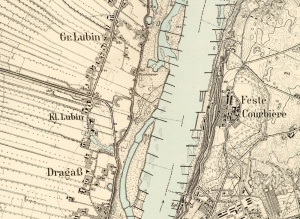Gross Lubin (Kuyavian-Pomeranian Voivodeship, Poland)
Gross Lubin (also known as Groß Lubien, Groß Lublin, Globe, Groß Lubin, Großlubin; now known as Wielki Lubień; coordinates: 53.52217, 18.73835 [53° 31' 19.8" N, 18° 44' 18.1" E]; population in 1905, 352; in 2012, 400), lies approximately 2 kilometres (1 mile) north of Dragacz (Dragaß), 5 kilometres (3 miles) north-west of Grudziądz (Graudenz), 23 km. (14 mi.) north-east of Świecie (Schwetz), and 55 km. (34 mi.) north of Toruń (Thorn). It was situated on the left bank of the Vistula River, like the adjacent hamlet of Klein-Lubin.
Gross Lubin is first mentioned in historical records in 1398. In the second half of the 16th century it was listed as a royal village. From 1591 Gross Lubin was a Holländerdorf, i.e., a village settled by Dutch Mennonite immigrants. At that time the Dutch settlers obtained a contract for 50 years. In 1623 it obtained exemption from the military tax and from obligatory quartering of soldiers, and in the lease of 1640, was granted freedom of religion, though it was not allowed to erect a meetinghouse. The Mennonites here were members of the congregation of Montau-Gruppe Mennonite Church. Both Gross-Lubin and Klein-Lubin repeatedly had much to suffer from floods. For this reason and also because the Polish Catholic clergy were very hostile to them, most Mennonites in the 18th century moved from here to other places.
Until 1772 Gross Lubin was located in what was known as Royal Prussia (also known as Polish Prussia) in the Kingdom of Poland. The First Partition of Poland in 1772 resulted in the creation of a new province on 31 January 1773, called West Prussia, in which Gross Lubin was located. Gross Lubin was situated in the district (Kreis) of Schwetz in Regierungsbezirk Marienwerder until the end of World War I, when it came under the jurisdiction of the Pomeranian Voivodeship of the Second Polish Republic. Gross Lubin came under the control of Nazi Germany during World War II until March 1945, when it was occupied by Soviet forces and returned to Poland. In 2013 Wielki Lubień was a village in the administrative district of Gmina Dragacz, within Świecie County, Kuyavian-Pomeranian Voivodeship.
The 1776 Prussian census lists 17 Mennonite families in Gross Lubin with the following surnames: Adrian, Baalau, Baltzer, Block, Bolt, Frantz, Goertz, Jantzen, Kerber, and Wohlgemuth. In 1935 there were eight families in Gross Lubin that were members of the Muntau-Gruppe Mennonite Church.
Bibliography
Stowarzyszenie Konserwatorów Zabytków. "Wielki Lubień." Catalogue of Monuments of Dutch Colonization in Poland. 2005. Web. 17 March 2013. http://holland.org.pl/art.php?kat=obiekt&id=501&lang=en.
Szper, F. Nederlandsche nederzettingen in West-Pruisen gedurende den Poolschen tijd. Enkhuizen: Bais, 1913: 130-134.
Wikipedia. "Wielki Lubień." Web. 17 March 2013. http://en.wikipedia.org/wiki/Wielki_Lubień.
Wolf, Hans-Jürgen. "Familienforschung in Westpreußen." Web. 29 September 2012. http://www.westpreussen.de.
Maps
Map:Wielki Lubień (Kuyavian-Pomeranian Voivodeship, Poland)
| Author(s) | Nanne van der Zijpp |
|---|---|
| Richard D. Thiessen | |
| Date Published | March 2013 |
Cite This Article
MLA style
Zijpp, Nanne van der and Richard D. Thiessen. "Gross Lubin (Kuyavian-Pomeranian Voivodeship, Poland)." Global Anabaptist Mennonite Encyclopedia Online. March 2013. Web. 3 Feb 2026. https://gameo.org/index.php?title=Gross_Lubin_(Kuyavian-Pomeranian_Voivodeship,_Poland)&oldid=123934.
APA style
Zijpp, Nanne van der and Richard D. Thiessen. (March 2013). Gross Lubin (Kuyavian-Pomeranian Voivodeship, Poland). Global Anabaptist Mennonite Encyclopedia Online. Retrieved 3 February 2026, from https://gameo.org/index.php?title=Gross_Lubin_(Kuyavian-Pomeranian_Voivodeship,_Poland)&oldid=123934.
Adapted by permission of Herald Press, Harrisonburg, Virginia, from Mennonite Encyclopedia, Vol. 2, p. 600. All rights reserved.
©1996-2026 by the Global Anabaptist Mennonite Encyclopedia Online. All rights reserved.


